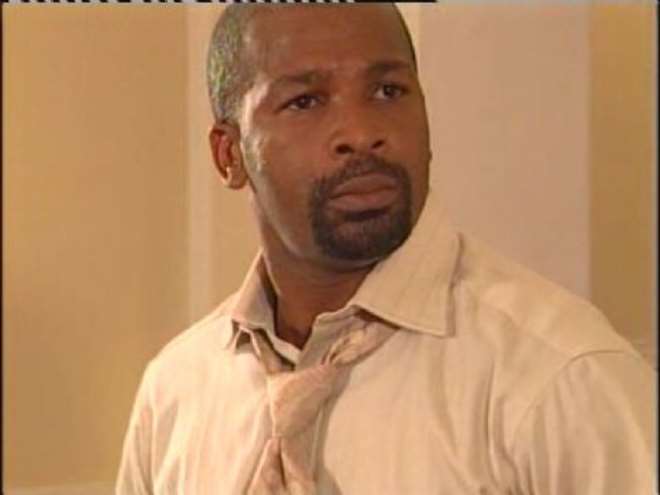NIGERIAN MOVIE INDUSTRY IS FAKE —YEMI SOLADE
Star actor, Yemi Solade is not happy with the decision to stop film production by Yoruba film producers. He spoke on this and other issues with BAYO ADETU and SEYI OLATUNJI
Q: How have you been enjoying the break given to Yoruba actors?
A: It is just an avenue to rest. But it is not as if I'm really on break. One of the professional bodies to which I belong–the Yoruba arm of the Association of Nigerian Theatre Practictioners (ANTP)–gave us some weeks or months to rest, but Yemi Solade is not on break.
Q: What is the major reason for the break?
A: I guess the leadership feels it is time to sanitise the sector. So many people were encroaching on a business they know nothing about and the leadership of ANTP, headed by Prince Jide Kosoko, believes that sanitising it would be the best thing for the true professionals like us to make a headway.
Q: Do you think the break is the right measure to sanitise the industry?
A: No. I have always been against that holiday. The holiday thing started about four years ago when Bayo Salami (Oga Bello) was leading the association. It all stemmed from the fact that some artistes were dying and the Bayo Salami-led executive probably believed pedestrians who said artistes were killing one another. That was the genesis of the very unpopular holiday. Now that Jide Kosoko is heading the association, I think the current holiday is informed by the presence of many gatecrashers in the field. And I support his own agenda. But I still will not support any decision that says we should sit at home and not work when we are mostly family heads. That is just the truth of the matter and this is the third month of the break.
Q: You said some artistes died. What killed them?
A: We lost Bimpe Adekola. We lost Yomi Ogunmola and even Gbenga Adeboye, who was considered a member of the association. What I meant was that the leadership listened to pedestrians.
Q: Who are the pedestrians?
A: People on the streets. The leadership listened to the rumours they were peddling and ignored what discerning minds were saying. People died of ill-health and they were thought to have been killed by fellow artistes. To me, that was pedestrian because autopsies were conducted and we knew how they died.
Q: How effective will the break be in sanitising the industry?
A: I don't know. I am waiting for the results because I have been seeing a lot of artistes and the ones I have seen are not doing well. A lot of them have lost weight. Those bleaching can no longer afford bleaching creams and it's a very interesting thing to see that without going to Idumota, most actors and producers in the Yoruba movie genre will just die off. We don't even know who and who have died. We are talking of the prominent ones that we see, what about less prominent ones? This is an association that has between fifteen and twenty thousand members in the South-West of Nigeria. And you are asking all of them to go and sit at home because you want to carry out a reform. Obasanjo did not tell us to sit at home while he was carrying out his reforms. To me, the decision is unpopular and I will never subscribe to it.
Q: What should have been done instead of the break?
A: The best thing is to disband the association and start re-admitting. Accreditation must be done; let us know who the genuine artistes are. I am a genuine artiste; a certificated artiste. In fact, I have become a Senior Actor of Nigeria; I'm a “SAN.” I have a certificate from “The Great Ife.” It is very unbecoming of a professional body to ask somebody like me to sit at home and not work. I think the best way to go about with the reform is to sift the grain from the chaff. The sit-at-home order is not the way out. Most members of the ANTP are artisans in other fields who are just encroaching into my field. I'm a certificated artiste; that tells you that I have gone to the university to study. I'm a graduate of Dramatic Arts. So, I am a bonafide artiste who has been licensed to work. And some people felt that they know my problem and they can diagnose it. That is what is happening in ANTP. If given the responsibility, I will disband the association and start readmitting like one of the most popular parties in Nigeria did some years back. Screen every member, tell the ones that don't have any interest in the profession to go back to what they were doing. Some of them are hairdressers, some unskilled labourers who felt at one time or the other they have the skills of the likes of Baba Sala and Ogunde and they could just walk into the field. And members who have been there for long, who didn't know how to make money felt they should just admit these gatecrashers
Q: How has the break affected you?
A: It has affected me because I have been arrested. But that doesn't mean I have not been working. I have been working with other associations. I belong to other splinter groups. I'm a member of NANTAP and AGN. I am still involved in Super Story and nobody can tell me not to work.
Q: As a trained artiste, how do you feel working with untrained ones?
A: I always have problems working with the unskilled ones, but I admit that some of them are really good. They are raw talents, but they don't have the power of articulation. Raw talent alone is not enough. Talented people should be able to articulate what they do. It does not just stop at being one clown or one babalawo (herbalist). You should be able to explain what you do. Most of the artistes in ANTP, because of their little or no education, cannot express themselves. This is a big problem and I don't know what the association is doing about it.
Q: How would you react to suggestions that Yoruba movies are inferior to Nigerian movies made in English?
A: I get angry when I hear people make such comments about the standard of Yoruba movies. I always say that one should not sit outside and criticise. You must come inside and see. When you get in, you will see the setting and know where to fit in. What I have done over time has been to go inside to see how things have been working. And I can only make that change positively by getting my act right. That is what I have been doing. I know the Nigerians who speak the cosmopolitan Yoruba that I speak. I grew up in Surulere, so my Yoruba is different. And my target audience are people who come from my kind of background: Surulere, Ilupeju, Ikoyi and Victoria Island. There are a lot of non-Yoruba people in Yoruba movies. People like Fathia Balogun, Rachael Oniga, Ngozi Nwosu, are not Yorubas, but they've excelled in Yoruba movies. So, what I have been able to do, and still do, is to make it attractive to the upper class. All these witchcraft stories will not lead anybody anywhere. Let us do drama and human angle stories that people will appreciate. They will talk about family values. I run away from these fetish stories and you don't find me in films with such because I do not believe in the babalawo stuff. I do not belong to the category of actors who like the fetish films. But I have been able to mix with them because I have to stoop to conquer. If I had not come down from my high level, maybe I would not have been in Yoruba movies at all. You would probably find me with the likes of Ramsey Nouah, RMD and Olu Jacobs. But I think I'm a king in Yorubaland and I want to remain so.
Q: You appeared in some Yoruba flicks, like Ale Ni Show, that actually left your fans disappointed. How selective are you with scripts?
A: I'm not selective. I can't be selective when the industry is distressed because nobody is going to pay me gratuity at the end of the day; nobody is paying me pension. I'm a family man and I pay bills, so I cannot be selective. I don't owe my fans any apology here. It is not a salaried job. The civil servant is paid whether he works or not. I use my body and soul to make a living, difference and name. I can't be selective until the industry is regulated. When I shoot a movie and I'm paid N50 million, then that will be the only movie I'll shoot in a year like it's done in Hollywood. At that point, I can be selective. There's a fake movie industry in Nigeria. That is why you see fake actors, fake everybody. The ladies are not looking real; too much make-up, everybody is looking fake. That is why you'll see a Segun Remi and say with all the roles he plays in movies, he's still trekking. Jide Kosoko is not rich. He still lives in a rented apartment, he buys Tokunbo cars. Nobody is rich, nobody is a star in the Yoruba movie industry. The earlier we got real, the better for us.
Q: We understand that actors earn N400,000 and N450,000 per movie. How come they are not rich, considering the number of movies they appear in?
A: I don't tell lies when it comes to my job. Most Yoruba movies are shot with budgets below N300,000. So, how will an actor earn N400,000? It's not possible and you know it. Nigerians also know that anybody earning N300,000 per script cannot be trekking. People should stop telling lies and that is why people in the corporate world believe that we don't have a problem. Those lying are characters who cannot walk into the corporate environment because they can't even write a feasibility study. All they want is to see a 419 or Yahoo Boy (Internet fraudster), take money from him and go on location. It's a blatant lie if anybody tells you he earns such from a producer. I have never earned that from a producer; it is only the likes of Tade Ogidan that will pay that. And that happens once in a while. A Tade Ogidan will not shoot movies every month, but the generality of producers in ANTP will work every week. Even those who have spent over four decades will still run to Idumota and collect N250,000 and so on. And when they get to somebody like me they will say: 'jo owo yi, mo to jo ni' ( I had to scrounge for this money). Anybody that pays you N50,000 in Yoruba movie industry feels he has paid you N50 million. It's not a lie. Why will a Funsho Adeolu be trekking around Lagos if he earns that much? Or Kayode Odumosu?
Q: Haven't you been talking to them? But when they see you they tell you they are earning N250,000. Area Boys see me and say: 'Ya eran fun wa. A fe gba owo film wa' (give us out of the big money you've been making).
A: Talking about Ale Ni Show or whatever, the producers, very lowly ones, will want to use a face like mine to sell. They think that when they get Yemi Solade, even for just one scene, the audience will buy it.
Q: Can you go to any length if the pay is right?
A: Yes. But one thing is that you will find me at the highest level because you will not expect me to remain with Tade Ogidan and Jimi Odumosu. The only time I worked with Tunde Kelani was seven years ago. Will I be waiting for Mainframe? Does he even pay that much? I was in Thunderbolt seven years ago, how much did he give me? And he has not invited me ever since.
Q: What is your view about most Yoruba actors producing movies?
A: People who do not have what it takes to be artistes, I mean genuine ones, will end up running to Idumota and collecting money from their godfathers to produce low quality movies. We will share the blame too, but my own blame, I will explain – for survival. Those boys, when they come in, try acting and when they find it difficult, move to something else. They could become costumiers and if that is not working, become location manager. Again, if they are not doing well in location management, they end up driving the location bus. Every other person in ANTP is one thing and the other, including being a producer, minus me. A driver in ANTP is a producer. The man who stands by the generator is a producer. The president of the association is also one, but I'm not one of them. I only act and direct once in a while. I have always said that without producing I will survive. But for those who produce all the time, and for the results we've been getting – poor production quality – it is clear that everybody cannot be an actor, but everybody wants to be part of the action. So, it should not amaze you that producers outnumber actors. Funsho Adeolu would have been like me, but he has produced two movies. I haven't produced and that is why I have singled out myself. I have never been to Idumota and I'm not doing badly.
Q: Why did you abandon directing for acting?
A: I will only direct when the fee is right. Directing is all-encompassing; a director is the overall boss in a production team. And I will not direct a film for just any fee. If I run into a producer that knows my worth as a director, I will do it.
Q: You are more committed to the ANTP than the AGN. Have you had problems breaking into the English movie circuit?
A: There is no barrier. First and foremost, I am a Yoruba man. When you talk about English, listen to me talk. I speak that language very well, you should not equate somebody like me with some of the prominent actors in the so-called Nigerian (English) movies, which I do not even agree are English movies. They are Igbo-English movies or Niger-Delta English movies. The fusion of Igbo language and English is IgboEnglish because the diction of most of the actors is heavily Igbo. They do not represent the true African setting that I want to be part of. And most of the stories that come out of that place are centred around voodoo. You cannot tell me that Jim Iyke is an English actor, he's an Igbo boy. RMD is a Warri actor, Omotola Jolade is a Yoruba actor, Sam Loco is a Benin actor, Keppy Ekpeyong is a Calabar/Efik actor. So, where does the English thing come in now?
Q: Have you ever been denied a movie role on account of where you come from?
A: I think it was about 10 years ago when I was shooting a movie called Homeless. A friend of mine, Kola Davies, who was the director, invited me and gave me a major role. But he wanted me to negotiate with the producer who happens to come from the East of the Niger. As soon as the guy saw me, he thought I was of the Igbo extraction and started speaking Igbo to me. I told him I was not Igbo and that killed his interest in me. Though I ended up shooting the movie, Francis Duru was brought in to shoot the lead, which I was supposed to. When I saw the signal, I knew that the rebel in me would not tolerate things like that. I would rather go to where I'm celebrated than where I'm tolerated.
Latest News
-
 "If You're For Me, I Am For You" - Cubana Chief P
"If You're For Me, I Am For You" - Cubana Chief P -
 "3 Days To Go" - Femi Adebayo Urges Fans To Get S
"3 Days To Go" - Femi Adebayo Urges Fans To Get S -
 "Stop Asking Me Questions About Speed Darlington"
"Stop Asking Me Questions About Speed Darlington" -
 "Benue Is The Most Underdeveloped State I've Ever
"Benue Is The Most Underdeveloped State I've Ever -
 Stan Alieke Urges Young Professionals To Take Lin
Stan Alieke Urges Young Professionals To Take Lin -
 Chizzy Alichi Teases Fans With Baby Reveal, Promot
Chizzy Alichi Teases Fans With Baby Reveal, Promot -
 "I'm Not Wearing Makeup From July 4th Till Decemb
"I'm Not Wearing Makeup From July 4th Till Decemb -
 "Stop The Challenge Of Mocking Kids With Down Syn
"Stop The Challenge Of Mocking Kids With Down Syn -
 Regina Daniels Celebrates Sons As They Mark Birthd
Regina Daniels Celebrates Sons As They Mark Birthd -
 Speed Darlington Threatens To Sue NAPTIP For Defam
Speed Darlington Threatens To Sue NAPTIP For Defam














